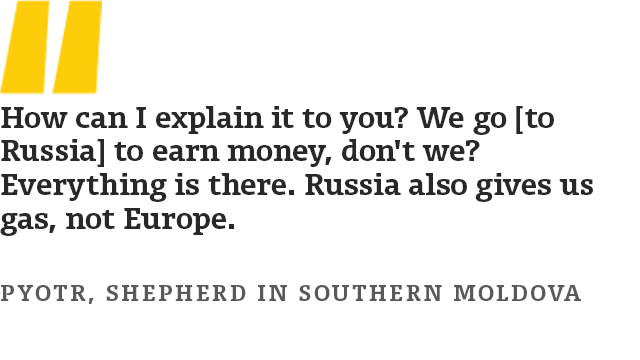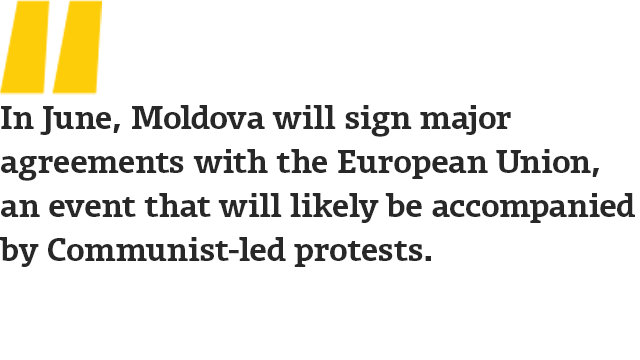
Moldovan women change pro-European Union slogans in Chisinau, Moldova, last November. Dan Morar/AP
Will This Be the Next Ukraine?
Transdniestria, a pro-Russian breakaway province, is keeping Moldovans out of the European Union. Sound familiar? By Robert Coalson
CHISINAU - It's a bright, sunny day and Chisinau residents are enjoying the first whiff of spring. Couples stroll through Cathedral Park, children chase pigeons, and families pose for photographs with a statue of the Easter Bunny. In the shadow of the Arch of Triumph, a small crowd watches intently as two young men face off over a giant chessboard. The opponents are evenly matched. The board is nearly empty and the setting sun casts long shadows across the park as a draw is declared.
It could be a metaphor for the state of the nation. Torn between Russia and the West, Moldova's fault lines are visible everywhere and are rendered more volatile by the country's weak sense of national identity. And the tension is clearly being strained by the crisis in neighboring Ukraine, as well as by Moldova's successful European-integration drive—and Moscow's determination to prevent it.
"If it was possible in this way that Russia annexed Crimea, why not Donbass, Kherson, Mykolayiv, Odessa, Transdniestria, and so on, and so on," says Igor Botan, director of the Association for Participatory Democracy in Chisinau. "The situation is very, very fragile." Botan notes that Moldova was among the last Soviet republics to declare independence, doing so only in August 1991 following Kiev's lead. Now, he says, Moldova's future seems again to be linked to Ukraine.
* * *
For more than a decade, successive Moldovan governments have pursued European-integration, and those efforts are now bearing fruit. Later this month, Moldovans will begin traveling to EU countries without visas; in June, Chisinau will sign an EU Association Agreement and a Deep and Comprehensive Free Trade Agreement.
But as those results come nearer, Moldova has come under heavy pressure from Russia and pro-Russian forces. "We have noticed since probably summer last year, 2013, an unusual activation of the Russian-speaking media in the Republic of Moldova promoting the alternative integrationist model," says Moldovan Deputy Prime Minister and Minister for Foreign Affairs and European Integration Natalia Gherman.

"Whereas we are pursuing European integration as an absolute priority of internal and external policy, the other side is advocating in favor of Eurasian integration and the Customs Union, which is officially the project pursued by the Russian Federation for many countries in the Russian neighborhood," she says.
Gherman admits that only "almost 50 percent" of Moldovans support the pro-EU course, saying the government has done a poor job to date of explaining the advantages of European-integration to average Moldovans in rural areas.
One of those rural areas is the semi-autonomous region of Gagauzia in the country's south, between Ukraine's Odessa region and Moldova's breakaway Transdniestria province. Solid majorities here favor of joining Russia's Customs Union. In February, Gagauzia voted—in a referendum that Chisinau rejected—overwhelmingly in favor of closer ties with Russia. More than 97 percent voted against EU integration. Congaz is a lively town about 30 kilometers south of the Gagauz capital, Comrat. People sell cakes and vegetables or graze small flocks of goats on the side of the truck-clogged highway that bisects the settlement. Everyone you speak to voted in the referendum—and everyone voted for the Customs Union. "I am for the union that I grew up in. The Soviet Union was and I want the continuation of that," says Stepan, a friendly middle-aged man who complains that every passing truck causes a "two-point earthquake" in his roadside house.
Nearby, Pyotr and a couple of other men are trying to get a flock of sheep and goats across the highway as the sun sets. Pyotr didn't vote in the referendum because he was in Russia, working as a lumberman. But his relatives all cast their ballots. "All of them voted for the Customs Union because it is better in Russia," he says as sheep scurry around his legs. "That's why. That is more our style. How can I explain it to you? We go there to earn money, don't we? Everything is there. Russia also gives us gas, not Europe."
Almost everyone on the streets of Congaz has relatives working in Russia. Although the Gagauz are ethnic Turks, they speak Russian and have adopted Orthodoxy. They have a deep distrust of the "Romanians" who they think are plotting to unite Moldova with Romania under the guise of European integration. Stefaneta is a middle-aged woman selling Easter cakes by the highway. Her wares are covered with the dust kicked up by passing trucks. She sees Moldova's pro-European course as a U.S. plot and wants nothing to do with it. "Wherever the United States sticks its nose, rudely speaking, there is only blood and chaos," she says. Four of her six children have Russian citizenship and are living in Kursk Oblast.
To the northeast from Gagauzia, one of Moldova's most conspicuous fault lines is the administrative border between the breakaway, pro-Russian region of Transdniestria and the rest of the country. About 70 kilometers northeast of Chisinau, the picturesque village of Dorotcaia is pressed up tight against Transdniestria. It is one of a handful of settlements on the left bank of the Nistru River that are still in Chisinau-controlled Moldova -- although about 90 percent of the land the villagers farm lies in Transdniestria.
It was the scene of heavy fighting during World War II as the Soviet Red Army fought bloody battles to cross the wide Nistru River. There was more fighting here during the 1992 war over Transdniestria, and the village's memorial to victims of that conflict is covered with fresh flowers. Some Dorotcaia residents think their town would be better off joining the breakaway region, while others worry that recent calls for a referendum on joining Transdniestria have been driven by misinformation. (Watch the video below to learn more.)
Transdniestria regularly asks for recognition or annexation by Russia. Most recently, the de facto parliament filed such a request with Moscow on April 16. Last month, Dorotcaia saw a small demonstration calling for a referendum on joining Transdniestria. Demonstrators noted that prices are cheaper in the Russia-subsidized breakaway region and argued that Moldova's integration into the EU will leave Moldovans without jobs.
"We want to all be together...so that there wouldn't be such a division," says a local pensioner who identifies himself only as Fedya and says that if the village holds a referendum, he will vote in favor of joining Transdniestria. "All our land is on that side of the highway and we can't work it now. They don't let our cows to pasture there. So that's why." But such voices are rare in Dorotcaia, where most of the approximately 3,000 residents are Romanian-speaking Moldovans. They see the calls for a referendum as a provocation by outsiders and say they would not participate.
Anatoly is a Russian-speaking plumber who fought "for Moldovan independence" during the 1992 war. He says the vast majority of Dorotcaia residents oppose the referendum proposal and won't participate if one is held. On the contrary, he says, the village backs the country's European-integration agenda. "The majority is in favor [of the Association Agreement with the EU]," he says. "You know the situation in Moldova. It is hard. But everyone is hoping for something better."
The school building in Dorotcaia, refurbished in part in 2007 with funding from USAID, actually houses two schools. Each day, some 160 Romanian-speaking children are bused across the administrative line from Transdniestria—from the neighboring village of Grigoriopol. The authorities in Transdniestria won't allow the children to study in Romanian or permit the school to use educational materials provided by Chisinau.

Eleonora Cercavschi is the director of the Grigoriopol school-in-exile. She sees the hand of Russia behind the calls for a referendum in Dorotcaia, saying such devices are "a hook" for Moscow, which "apparently doesn't have enough territory."
"It has become fashionable to talk about referendums," Cercavschi says. "And definitely some little fish will bite [on this hook]. Because there are different people everywhere—especially since for so many years those people lived in the Soviet Union, under Russia, to speak more precisely. That territory never had freedom of thought. They never had information. If you turn on Russian television, you can see stuff now that you couldn't see even back in Soviet times."
She says authorities in Transdniestria browbeat everyone in the republic to subscribe to the region's heavily subsidized satellite-television provider. "They make us pay to have our own brains washed," she laughs.
* * *
Moldova will face several key tests this year. May 9 is Victory Day, and many in the region anticipate that Moscow will use the commemorations to rally support for the achievements of the Soviet Union through mass, pro-Russian rallies. In June, Moldova will sign major agreements with the European Union, an event that will likely be accompanied by Communist-led protests. That scenario will likely be repeated weeks later when parliament ratifies the accords.
But the big test will come at the end of November, when Moldovans go to the polls to elect a new parliament. It is far too early to tell whether the fractious, pro-European ruling coalition can pull out a victory, since its component parties will be running against one another as well as against the Communists and Socialists. This, together with the ominous developments in Ukraine, has the "almost 50 percent" of Moldovans who support European integration very worried, says Chisinau political analyst Botan.
"We see who is together with Russia," Botan says. "Kazakhstan and Belarus. Russia is a kind of authoritarian system. Kazakhstan and Belarus as well, authoritarian. But if Russia builds a community, so-called Eurasian Union using such components, we say, 'No, it is better for us to stay far from this.'"




